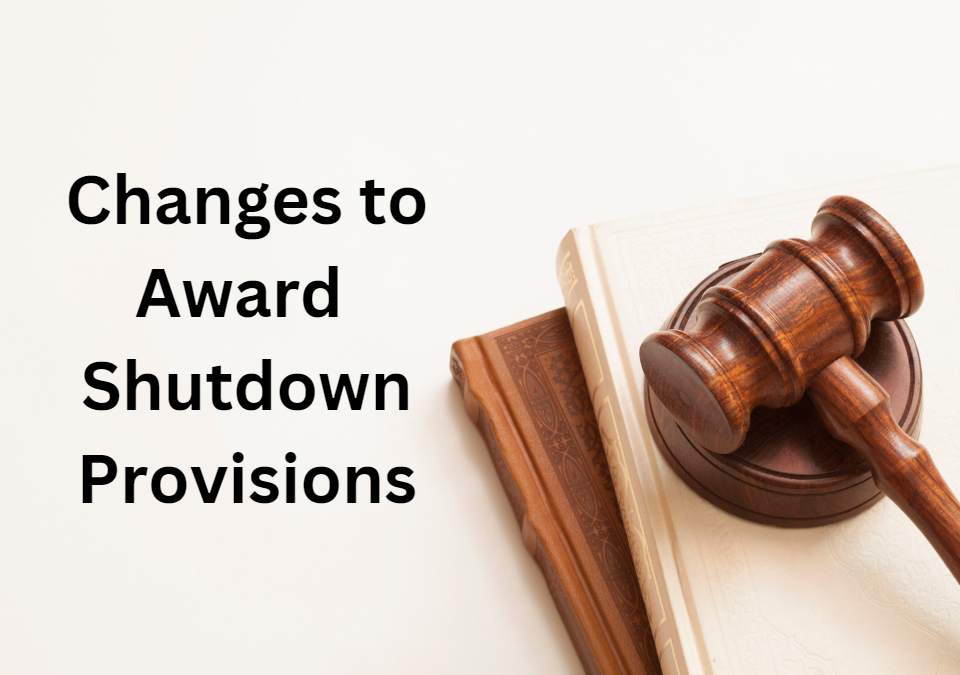Following on from a recent plethora of changes to the Fair Work Act, changes to the shutdown provisions in many Awards became effective on 1st May 2023.
Many Awards have historically included provisions for the temporary closure of a business (“shutdowns”). Most typically, shutdown provisions are used by businesses to manage the absence of staff due to closure over the Christmas / New Year period. Generally, all employees are required to be absent from work during a time of shutdown.
Award provisions have typically required employees to take their annual leave to cover this period. In the case of an employee with insufficient annual leave to cover the shutdown period, they were generally required to take leave without pay.
What are the changes?
The Fair Work Commission has amended 78 Modern Awards (from 1st May 2023) to include a varied shutdown clause. Significantly, the ability to direct an employee without sufficient leave to take leave without pay during this time has been removed.
Under the changes:
• Employers are required to give employees affected by a temporary shutdown at least 28 days’ written notice of the shutdown if the employer wants employees to take paid annual leave during the shutdown period. Note that in some modern Awards (for example, the Building and Construction General Onsite Award), this period is longer. Where a longer period applies, it has been retained. Be sure to check applicable Awards for details. Employers and the majority of impacted employees may agree to a shorter notice period.
• Employers can direct employees to take a period of paid accrued annual leave during the shutdown period, so long as the direction is provided in writing and is ‘reasonable’. Note that reasonable has not been defined.
• Employers and employees with insufficient leave to cover the shutdown period may also agree (in writing) to access paid annual leave in advance during a shutdown, or utilise any accrued time-in-lieu that might be available.
• While employers and employees can agree, in writing, for the employee to take a period of leave without pay during a part of the shutdown, employers are no longer be able to direct an employee to take a period of leave without pay during a shutdown. In other words, if an employee does not have sufficient leave to cover the period of shutdown and they do not agree to take it as leave without pay, OR agree to a period of annual leave in advance, OR use any available time-in-lieu, they will have to be paid for the period (or continue to work).
Modern Awards are in the process of being updated to reflect these changes.
What do employers need to do?
• Review any relevant policies and/or contract provisions to ensure Award compliance. Consideration should also be given to the question of reasonableness of a direction to take annual leave and how this will be demonstrated if questioned.
• Implement a process to provide the required notice of any proposed shutdown and issue written directives to take annual leave (at least 28 days in advance), in accordance with individual Award requirements.
• Anticipate available annual leave balances for employees prior to the proposed shutdown and plan to engage in 1:1 discussions with any employees who may not have a sufficient leave balance to cover the period. Consult with them to consider and agree on arrangements.
• Proactively manage annual leave throughout the year to ensure that employees maintain enough leave to cover a proposed future shutdown period. The Fair Work Act allows an employer to refuse an employee’s request for annual leave if the refusal is reasonable. In revealing this decision, the FWC expressed a view that the refusal of an annual leave request may be reasonable if its approval would result in the employee having an insufficient leave balance to cover a future shutdown.
A list of Awards that have been impacted by this change is available on the Fair Work Ombudsman website: click here.
HR Success can assist you to implement this change, and provide you with template letters to issue to employees to meet your obligations. Give us a call for details.
Note that this is general information only, not formal or legal advice. Information is current and we believe accurate at the time of publication – 07/05/2023.

